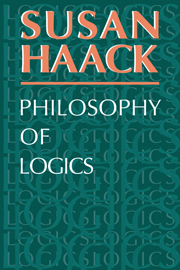Book contents
- Frontmatter
- ACKNOWLEDGMENTS
- Contents
- Preface
- Notation and abbreviation
- 1 ‘Philosophy of logics’
- 2 Validity
- 3 Sentence connectives
- 4 Quantifiers
- 5 Singular terms
- 6 Sentences, statements, propositions
- 7 Theories of truth
- 8 Paradoxes
- 9 Logic and logics
- 10 Modal logic
- 11 Many-valued logic
- 12 Some metaphysical and epistemological questions about logic
- Glossary
- Advice on reading
- Bibliography
- Index
4 - Quantifiers
Published online by Cambridge University Press: 05 June 2012
- Frontmatter
- ACKNOWLEDGMENTS
- Contents
- Preface
- Notation and abbreviation
- 1 ‘Philosophy of logics’
- 2 Validity
- 3 Sentence connectives
- 4 Quantifiers
- 5 Singular terms
- 6 Sentences, statements, propositions
- 7 Theories of truth
- 8 Paradoxes
- 9 Logic and logics
- 10 Modal logic
- 11 Many-valued logic
- 12 Some metaphysical and epistemological questions about logic
- Glossary
- Advice on reading
- Bibliography
- Index
Summary
The quantifiers and their interpretation
‘(x) Fx’ is usually read long the lines of ‘For all x, Fx’, and ‘(∃x)Fx’ along the lines of ‘For some x, Fx’ or, more accurately, ‘For at least one x, Fx’; ‘(…)’ is generally known as the universal, ‘(∃ …)’ as the existential, quantifier. A variable inside the scope of a quantifier, such as ‘x’ in ‘(∃x) Fx’, is said to be bound, a variable not bound by any quantifier, such as ‘x’ in ‘Fx’, or ‘y’ in ‘(∃x) Rxy’, to be free. A formula with one or more free variables is called a (1-, 2- … n-place) open sentence, a formula without free variables a closed sentence (or ‘o-place open sentence’). So prefixing a quantifier, ‘(x)’ or ‘(∃x)’ to an open sentence, such as ‘Fx’ with just ‘x’ free, yields a closed sentence, ‘(x) Fx’ or ‘(∃x) Fx’; in general, prefixing a quantifier binding one of its free variables to an open sentence with n free variables yields an open sentence with n − 1 free variables.
Some formulations of the predicate calculus have singular terms, ‘a’ ‘b’, ‘c’ … etc. as well as variables; these are individual constants, each denoting some specific individual. By dropping a quantifier and replacing the variable(s) it bound by singular terms, one obtains an instance of the quantified formula, as e.g. ‘Fa → Ga’ is an instance of ‘(x) (Fx → Gx)’.
- Type
- Chapter
- Information
- Philosophy of Logics , pp. 39 - 55Publisher: Cambridge University PressPrint publication year: 1978



